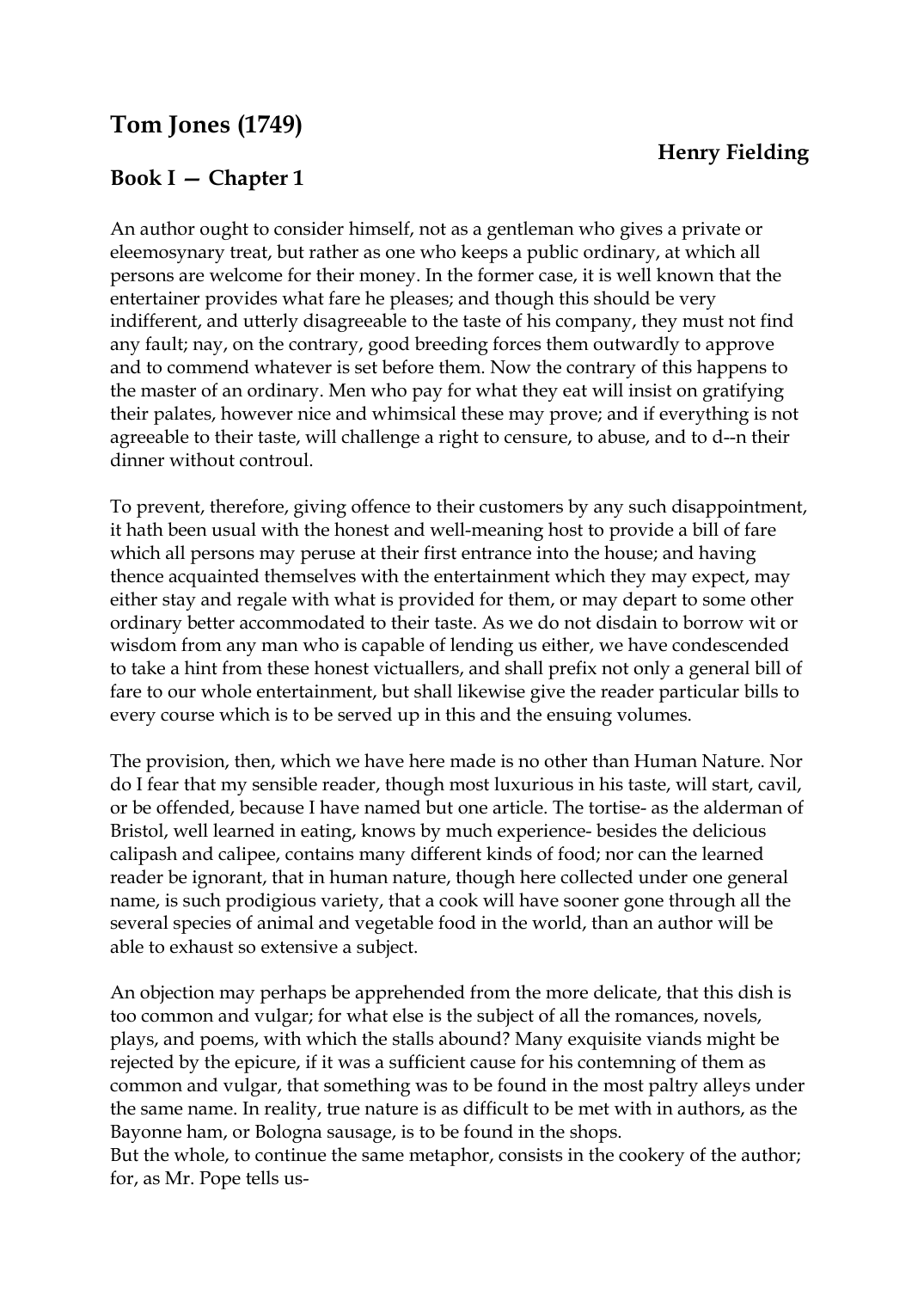Tom Jones (1749)Henry FieldingBook I -- Chapter 1An author ought to consider himself, not as a gentleman who gives a private oreleemosynary treat, but rather as one who keeps a public ordinary, at which allpersons are welcome for their money.
Publié le 22/05/2020
Extrait du document
«
Tom Jones (1749)
Henry Fielding
Book I — Chapter 1
An author ought to consider himself, not as a gentleman who gives a private or
eleemosynary treat, but rather as one who keeps a public ordinary, at which all
persons are welcome for their money.
In the former case, it is well known that the
entertainer provides what fare he pleases; and though this should be very
indifferent, and utterly disagreeable to the taste of his company, they must not find
any fault; nay, on the contrary, good breeding forces them outwardly to approve
and to commend whatever is set before them.
Now the contrary of this happens to
the master of an ordinary.
Men who pay for what they eat will insist on gratifying
their palates, however nice and whimsical these may prove; and if everything is not
agreeable to their taste, will challenge a right to censure, to abuse, and to d--n their
dinner without controul.
To prevent, therefore, giving offence to their customers by any such disappointment,
it hath been usual with the honest and well-meaning host to provide a bill of fare
which all persons may peruse at their first entrance into the house; and having
thence acquainted themselves with the entertainment which they may expect, may
either stay and regale with what is provided for them, or may depart to some other
ordinary better accommodated to their taste.
As we do not disdain to borrow wit or
wisdom from any man who is capable of lending us either, we have condescended
to take a hint from these honest victuallers, and shall prefix not only a general bill of
fare to our whole entertainment, but shall likewise give the reader particular bills to
every course which is to be served up in this and the ensuing volumes.
The provision, then, which we have here made is no other than Human Nature.
Nor
do I fear that my sensible reader, though most luxurious in his taste, will start, cavil,
or be offended, because I have named but one article.
The tortise- as the alderman of
Bristol, well learned in eating, knows by much experience- besides the delicious
calipash and calipee, contains many different kinds of food; nor can the learned
reader be ignorant, that in human nature, though here collected under one general
name, is such prodigious variety, that a cook will have sooner gone through all the
several species of animal and vegetable food in the world, than an author will be
able to exhaust so extensive a subject.
An objection may perhaps be apprehended from the more delicate, that this dish is
too common and vulgar; for what else is the subject of all the romances, novels,
plays, and poems, with which the stalls abound? Many exquisite viands might be
rejected by the epicure, if it was a sufficient cause for his contemning of them as
common and vulgar, that something was to be found in the most paltry alleys under
the same name.
In reality, true nature is as difficult to be met with in authors, as the
Bayonne ham, or Bologna sausage, is to be found in the shops.
But the whole, to continue the same metaphor, consists in the cookery of the author;
for, as Mr.
Pope tells us-.
»
↓↓↓ APERÇU DU DOCUMENT ↓↓↓
Liens utiles
- To what extent can social media be a tool for the public to have their say in political matters
- Tom Jones de Henry FIELDING (Résumé & Analyse)
- LE DISCOURS D’UN ROIFrançais Anglais In the first instance, i’m going to recapitulate the movie for those of you who don’t know.
- TOM JONES
- Sujet national, septembre 2005, série L, LV1: Lê Thi Diem Thùy, The gangster we are ali looking for, 2004 .

































